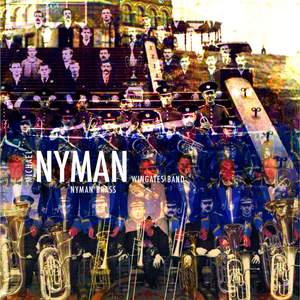The two main sequences on the album Nyman Brass – performed by Wingates Band – are from Michael Nyman's scores to The Ogre [Volker Schlondorff, 1996] and The Libertine [Laurence Dunmore, 2005]. The Ogre was never seen in the UK and the soundtrack not released here, so this presents the first opportunity for many people to hear this music. Originally composed for brass ensemble with saxophones, Wingates Band's performance is not hugely different from the original. The album is completed with the Michael Nyman Band classics, In Re Don Giovanni and Chasing sheep is best left to shepherds from The Draughtman's Contract [Peter Greenaway, 1982], where the music sounds very different from the original performances. Michael Nyman says: "The whole sound-world was transformed. Things like repeated rhythms which I originally gave to piano are punchier, edgier, more dangerous on cornets and trombones." Wingates Band was formed in 1873 by the members of the Bible Class of Wingates Independent Methodist Church in Westhoughton, Bolton, in response to a challenge from the members of Westhoughton Old Band, which had been in existence since 1858. By the turn of the century, led by legendary 'giant' of the British brass band movement William Rimmer, Wingates had been turned into one of the top bands in the country. In 1906 the Band achieved national fame by winning the 'double': the British Open and the British National Championships. The following year Wingates astounded the brass band world by completing the double again. Michael Nyman described it as "a privilege" to work with Wingates. Although his music was very different from the kind that the players were used to, he said they "picked up the style, especially the formality of the music, and it soon sounded second nature to them… I loved the spirit of the playing, the instant dedication and the energy in what is a very new sound world for me."





